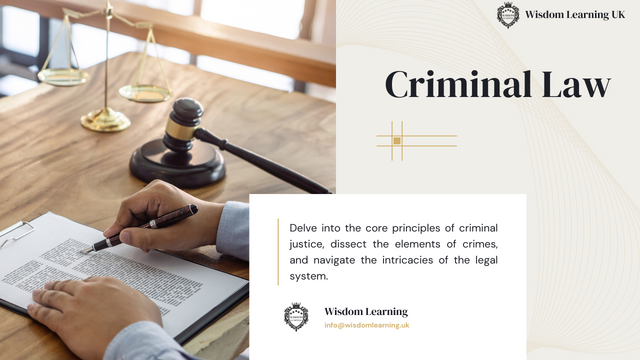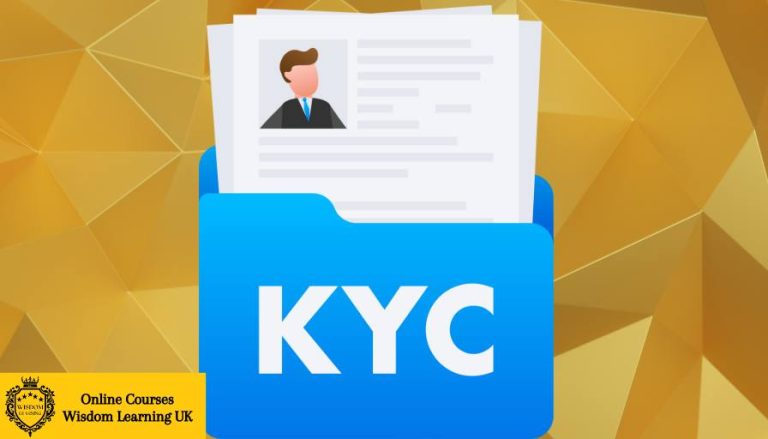Criminal Law

Explore the fascinating world of criminal law in our comprehensive Criminal Law Course. Delve into the core principles of criminal justice, dissect the elements of crimes, and navigate the intricacies of the legal system. Gain a deep understanding of crime prevention, police procedures, the prosecution process, and the critical role of defense. Uncover the nuances of various offences, from theft to sexual crimes, and examine the impact of white-collar and cybercrimes on society. Whether you’re a law student, legal professional, or aspiring law enforcement officer, this course equips you with the knowledge and skills to excel in the field of criminal law and make a meaningful impact on the justice system.

Who is this course for?
This Criminal Law course is designed for individuals who are interested in pursuing a career in the field of law, law enforcement, or related professions. It is suitable for:
Law Students: This course provides a solid foundation for law students looking to specialise in criminal law or anyone seeking to enhance their legal knowledge.
Legal Professionals: Practicing lawyers, paralegals, and legal assistants can benefit from this course by deepening their understanding of criminal law principles and procedures.
Law Enforcement Personnel: Police officers, investigators, and other law enforcement professionals can gain valuable insights into criminal law, enhancing their ability to enforce the law effectively.
Criminal Justice Practitioners: Probation officers, court personnel, and professionals involved in the criminal justice system can develop a comprehensive understanding of criminal law.
Aspiring Criminal Justice Workers: Individuals aspiring to work in areas such as probation services, youth justice, or prison management can use this course as a stepping stone to their careers.
What I will learn?
- Understand the Nature of Crime: Gain a comprehensive understanding of what constitutes a crime, its various classifications, and its impact on society.
- Comprehend Legal Principles: Develop a solid grasp of the foundational legal principles that underpin the criminal justice system.
- Analyse Actus Reus and Mens Rea: Differentiate between the actus reus (criminal act) and mens rea (criminal intent) elements of a crime and evaluate their significance.
- Explore Inchoate Liability: Examine incitement, conspiracy, and attempt as forms of inchoate liability and understand their legal implications.
- Understand Participation in Crimes: Identify the roles of principals, accomplices, and innocent agents in criminal activities and assess the concept of transferred malice.
- Evaluate Crime Prevention Strategies: Explore various crime prevention approaches, including situational and social crime prevention, and their effectiveness.
- Examine the Role of Police: Analyse the roles, responsibilities, and accountability of law enforcement agencies in the criminal justice system.
- Delve into the Prosecution Process: Understand the prosecution process, including cautioning, prosecution of mentally disordered offenders, and the Code for Crown Prosecutors.
- Study Youth Justice System: Explore the youth justice system in the UK, including youth courts, diversion, and sentencing of young offenders.
- Comprehend the Trial Process: Gain insight into adversarial justice, the role of trials, jury selection, defendant's rights, and the appeals process.
- Learn about Sentencing: Explore the aims of sentencing, different types of sentences, and factors affecting sentencing decisions.
- Analyse Homicide: Examine the legal aspects of homicide, including murder, culpable homicide, manslaughter, and related appeals.
- Investigate Offences against the Person: Study offences such as assault, battery, and assaults on emergency workers.
- Examine Sexual Offences: Understand sexual assault, engaging in sexual activity without consent, and rape laws.
- Explore Theft Offences: Analyse the Theft Act of 1968, actus reus, mens rea, and related theft offences.
- Study Blackmail, Robbery, and Burglary: Understand the elements of blackmail, robbery, and burglary offences.
- Scrutinise White-Collar Crime: Investigate white-collar crime, including offences under the Theft Act of 1968 and the Fraud Act of 2006.
- Discuss Terrorism and Law: Explore the concept of terrorism, its causes, and the legal framework for prosecuting terrorist activities.
- Examine Property Offences: Study property-related offences involving deception, dishonesty, and evasion of liability.
- Learn about Cybercrime and Piracy: Understand cybercrime, piracy, relevant legislation, and international conventions related to cybercrime.
- Discover Prisons: Explore the origins of prisons, the prison system in England and Wales, inmate categories, and the impact of incarceration.
- Understand the Probation Service: Examine the origins, functions, and priorities of the probation service, as well as parole.
Course Curriculum
Module 1: Introduction to Criminal Law
-
Introduction to Criminal Law
Module 2: Elements of a Crime
-
Elements of a Crime
Module 3: Incitement, Conspiracy and Attempt
-
Incitement, Conspiracy and Attempt
Module 4: Participation
-
Participation
Module 5: Crime Prevention
-
Crime Prevention
Module 6: The Police
-
The Police
Module 7: Prosecution, Caution and Diversion
-
Prosecution, Caution and Diversion
Module 8: Youth Justice
-
Youth Justice
Module 9: The Trial
-
The Trial
Module 10: Sentencing Process
-
Sentencing Process
Module 11: Homicide
-
Homicide
Module 12: Offences against Person
-
Offences against Person
Module 13: Sexual Offences
-
Sexual Offences
Module 14: Theft
-
Theft
Module 15: Blackmail, Robbery & Burglary
-
Blackmail, Robbery & Burglary
Module 16: White-Collar Crime
-
White-Collar Crime
Module 17: Terrorism & Law
-
Terrorism & Law
Module 18: Property Offences
-
Property Offences
Module 19: Cybercrime & Piracy
-
Cybercrime & Piracy
Module 20: Prisons
-
Prisons
Module 21: Probation Service
-
Probation Service
Module 22: War Crimes
-
War Crimes
GET YOUR CERTIFICATE & TRANSCRIPT
-
GET YOUR CERTIFICATE & TRANSCRIPT
Certificate of Completion - Free
Add this certificate to your resume to demonstrate your skills & increase your chances of getting noticed.

-
LevelAll Levels
-
Duration13 hours
-
Last UpdatedJanuary 17, 2024
-
Enrollment validityEnrollment validity: Lifetime
-
CertificateCertificate of completion
Recommended for You
Who Should Enroll?
Criminal Defence Lawyer: Become a solicitor or barrister specialising in criminal law, representing individuals accused of crimes, and providing legal advice.
Prosecutor: Work as a Crown Prosecutor, responsible for bringing criminal cases to court on behalf of the Crown and ensuring justice is served.
Police Officer: Join a police force and work on the front lines of law enforcement, investigating crimes, maintaining public order, and ensuring community safety.
Probation Officer: Supervise and rehabilitate individuals serving community sentences, helping them reintegrate into society and prevent reoffending.
Youth Justice Worker: Work with young offenders within the youth justice system, providing support, guidance, and diversion programmes to help them rehabilitate.
Corrections Officer: Serve as a corrections officer in prisons, overseeing inmate activities, ensuring security, and assisting with inmate rehabilitation efforts.
Legal Advisor: Provide legal advice and support in various sectors, including government agencies, non-profit organisations, and private corporations, with a focus on criminal law matters.
Crime Analyst: Analyse crime data and trends to assist law enforcement agencies in developing strategies to reduce crime rates and improve community safety.
Security Consultant: Offer security consulting services to organisations, advising on crime prevention measures and risk mitigation strategies.
Academic or Researcher: Pursue a career in academia or research, contributing to the development of criminal law knowledge and policies.
Want to receive push notifications for all major on-site activities?













